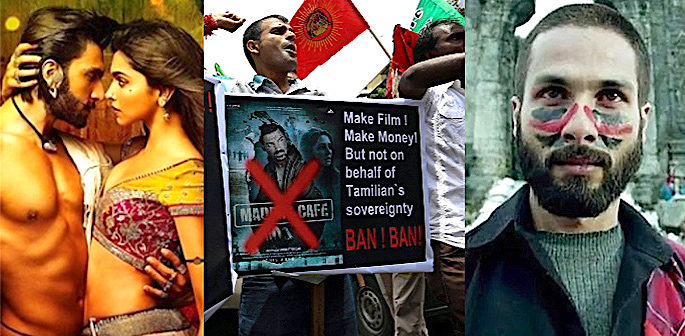"The film's theme is alien to our culture"
Anyone who watches Indian films knows that protests and public dissent are common when it comes to entertainment in India.
There are so many movies that have been controversial owing to their content and subject matter.
Sometimes even the lifestyle and opinion of stars and directors also influence the outcome and perception of a film.
Every time a film touches any sensitive topic, Indian audiences don’t take it lightly. These topics could be relevant to faith, historical values, societal beliefs, politics or cultural taboos.
The Indian Censor Board has also been criticised for its very strict and old-fashioned approach.
Additionally, it has a history of banning films for even the slightest explicit content.
Although the situation has improved over the years, the majority of people in India still remain intolerant in their views.
Indian films are replete with examples that led to protests or major controversies and had to undergo certain changes.
We take a look at 10 such contentious movies with themes that deal with communal violence to homosexuality and politics to history.
Interestingly, these films garnered rave reviews by critics and were appreciated at international film festivals.
Padmaavat (2018)

Amongst Indian films, one that instantly strikes everyone’s mind is Sanjay Leela Bhansali’s Padmaavat.
It was not long ago that it generated huge controversy and took the media by storm.
The film was initially titled ‘Padmaavati’ and is based on a 16th-century Sufi epic poem.
It stirred quite a ruckus and was not well received by the Rajput community in many parts of India.
The Rajput Karni Sena, a Rajput organisation, was at the helm of these protests. They believed the film was inappropriate and historically inaccurate.
With torched cars, burnt effigies, sloganeering and demonstrations, the protest kept on spiralling and took place across the whole country.
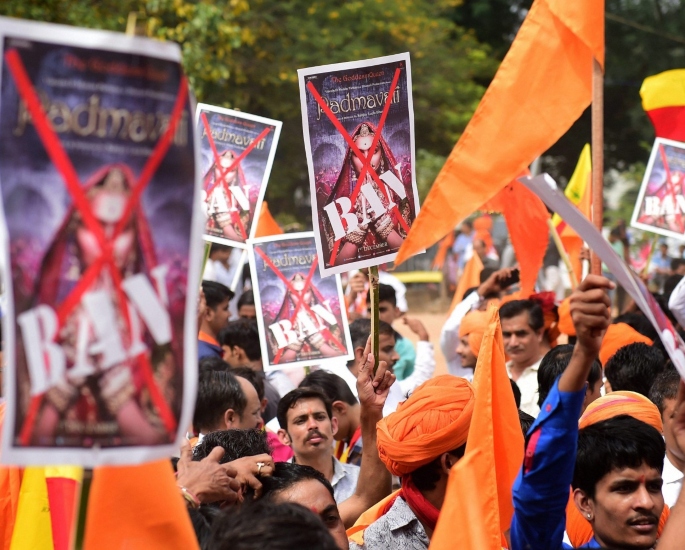
Deepika Padukone, who played queen Padmaavati, also received various threats from people and some of them even demanded that she be decapitated.
The Rajputs claim that their history was distorted and their queen was shown wearing revealing attire.
They also objected to a scene where she has an intimate moment with a Muslim invader, Khilji, played by Ranveer Singh.
Ultimately, Bhansali had to change the name of the film to Padmaavat. He also edited some scenes to release it.
Haider (2014)
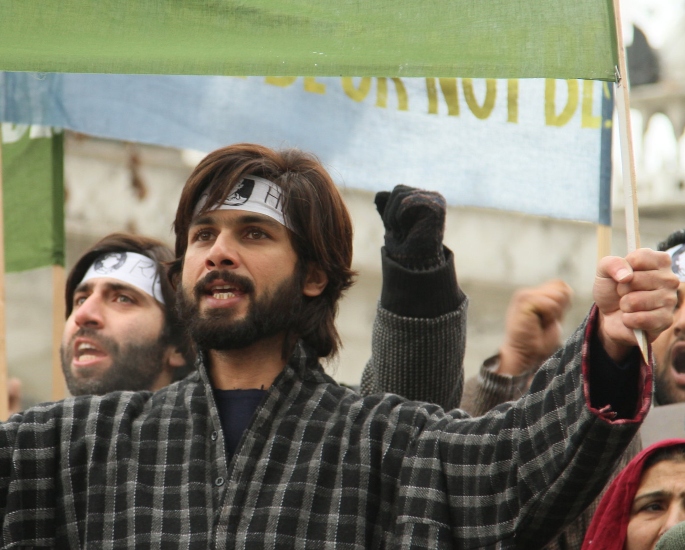
One of the most talked-about Indian films of 2014, Haider, is a directorial masterpiece of Vishal Bhardwaj.
It faced protests and dissatisfaction from local people while the shooting was still going on.
The film is set in Kashmir and stars Shahid Kapoor (Haider Meer), Irrfan Khan (Roohdar) and Shraddha Kapoor (Arshia Lone).
It is based on Shakespeare’s famous tragic play Hamlet (1603).
Local people from Kashmir and some other parts of India protested against the film. They took offence to the way the Indian army was portrayed.
They objected to the scenes showing human rights violations by the Indian army and their treatment of Kashmiri people.
When Bhardwaj was shooting the film inside the Kashmir University, the on-campus students also went into a protest.
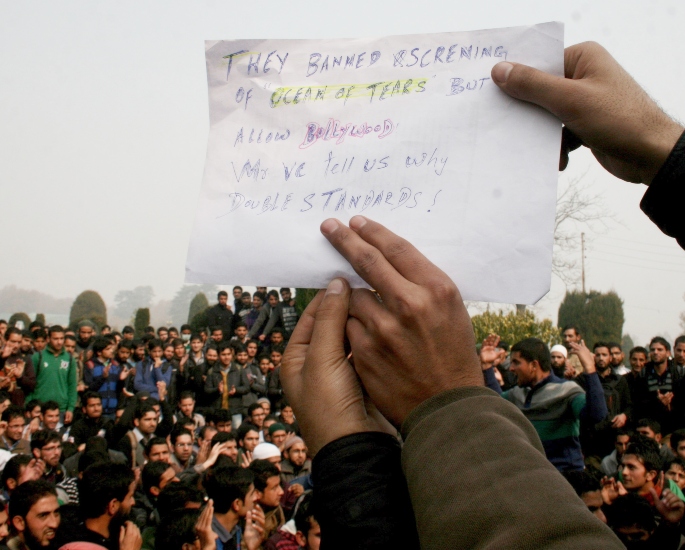
They showed agitation against hoisting the national flag on a fake bunker.
Later, police were deployed for security reasons. Protestors were made to leave and some students were detained for unlawful activity.
According to India Today, Kashmir University Students’ Union made a statement that they were protesting against all kinds of disobedience:
“Students also objected to Irrfan Khan, when he was spotted smoking inside the smoke-free campus.”
However, the movie was successfully released and earned good reviews, despite the initial scuffle.
Ram-Leela (2013)

Director Sanjay Leela Bhansali and his films are somehow always on the radar of social vigilantes and activists.
His film Goliyon Ki Rasleela: Ram-Leela also faced a lot of turbulence.
A large number of protests took place in different parts of India at the time of its release.
In the film, Ranveer Singh plays Ram Rajadi and Deepika Padukone portrays Leela Sanera. The bone of contention was the title and the provocative allusions to certain communities.
The Kshatriya (warrior) community in Gujarat’s Rajkot city was offended by the names ‘Jadeja’ and ‘Rabari.’
These names were given to the two rival families in the film. One of the film’s songs ‘Ghoomar’ also hurt the religious sentiments of the Kshatriya communities.
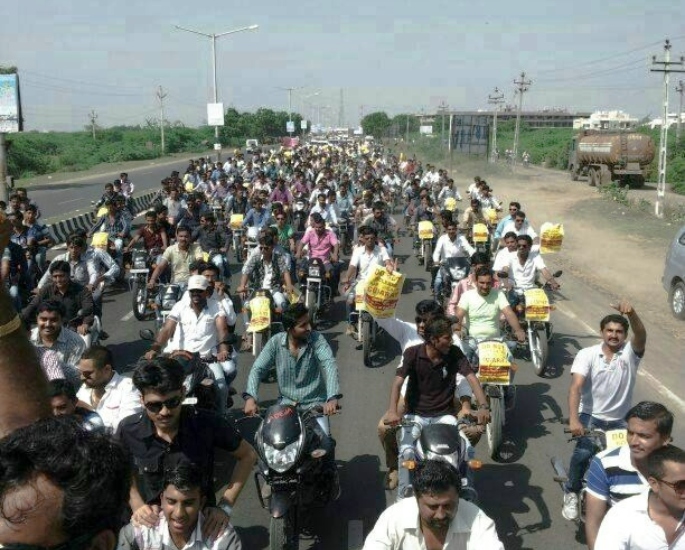
NGOs, extremist social welfare workers and some faith groups also showed dissent towards the film and held mass protests.
Some burnt posters of the film and stopped the screenings. At some places, people were even asked to leave the theatres.
Bhansali had to later change the movie’s title, first from ‘Ramleela’ to ‘Ram-Leela’ and then to the present one.
He also changed the names ‘Jadeja’ and ‘Rabari’ to ‘Sanedo’ and ‘Rajri.’ Later, the protests ended with the intrusion of the police.
Madras Cafe (2013)
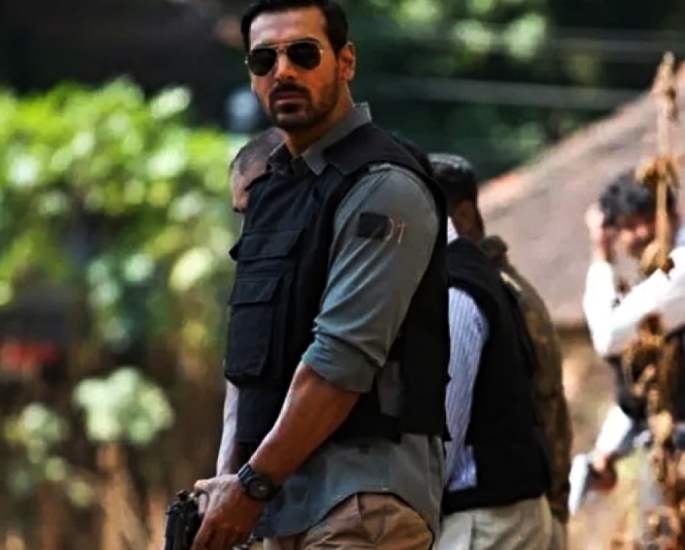
Madras Cafe is a political thriller starring John Abraham (Major Vikram Singh). It is directed by Shoojit Sircar. It also ran into a huge controversy in 2013.
In the film, John plays an Indian Intelligence agent in Sri Lanka. It is based on the civil war between the government and Liberation Tigers of Tamil Eelam (LTTE) in the 80s.
Local people, students and members of pro-Tamil political organisations in Tamil Nadu protested for a ban on the film.
They claim that the LTTE were shown in a bad light and the movie was anti-Tamil. After a demand by the protesters, the makers of the film arranged for a preview.
However, the demonstrators did not budge and continued with their stand. They also submitted a complaint to the police against its release.
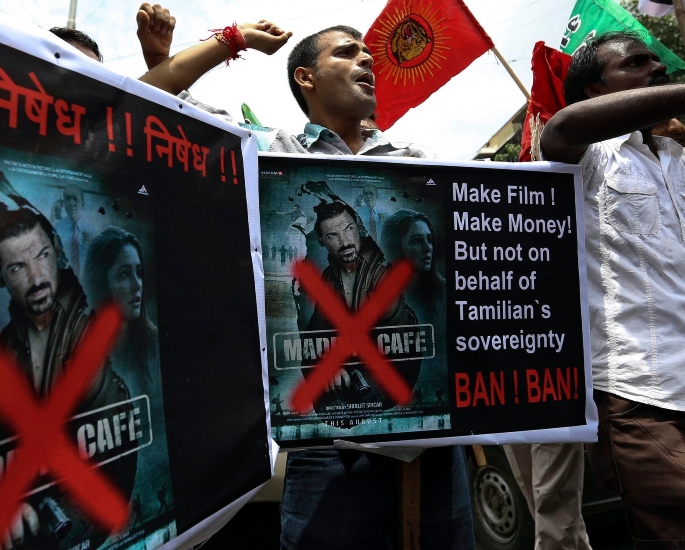
Seeman, leader of the Tamil group, Naam Tamizhar Katchi, said about the film:
“The aim of the movie is to portray Prabhakaran(leader of the LTTE at that time) as a villain. We cannot accept the movie in any form.”
Sircar, however, maintains that the film only shows reality. He conveyed to the BBC:
“The film is a work of fiction, but it is based on research into real events.”
“It has a resemblance to actual political events, dealing with civil war and the ideology of a rebel group.”
After numerous petitions, the Madras High Court did not ban the whole film but banned it in Tamil Nadu.
Vishwaroopam (2013)

Vishwaroopam was a mega-project by Kamal Haasan, the superstar of South Indian cinema. He acted, directed and produced the movie.
It was a big hit at the box office and made millions. Kamal Haasan plays a Muslim man, Wisam Ahmad, who pretends to be Hindu for an undercover army mission.
The film’s plot revolves around Indian intelligence services’ participation in America’s war on terror after the 9/11 attacks.
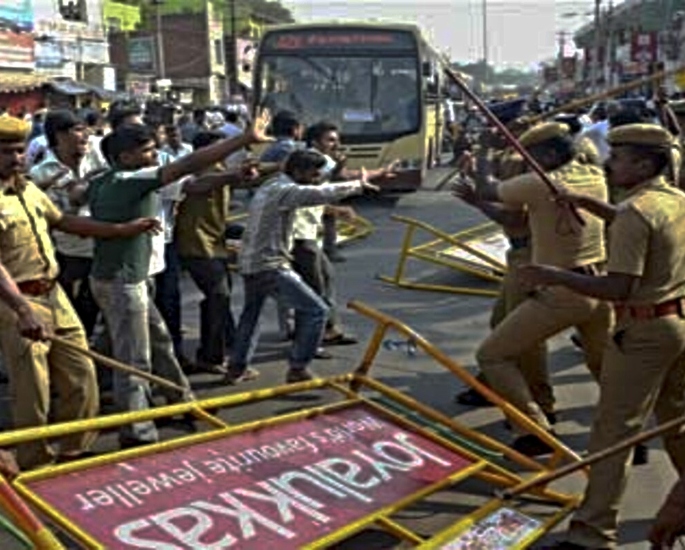
Several Muslim civic organisations protested against the film’s release in Tamil Nadu. This resulted in a ban on the film in the state for 15 days by the state government.
The film allegedly hurt the sentiments of the Muslim community. Following this, the film’s release was also delayed in the other south Indian states.
After these protests, controversial scenes were morphed and the film was finally shown to the public in Tamil Nadu.
OMG-Oh My God! (2012)
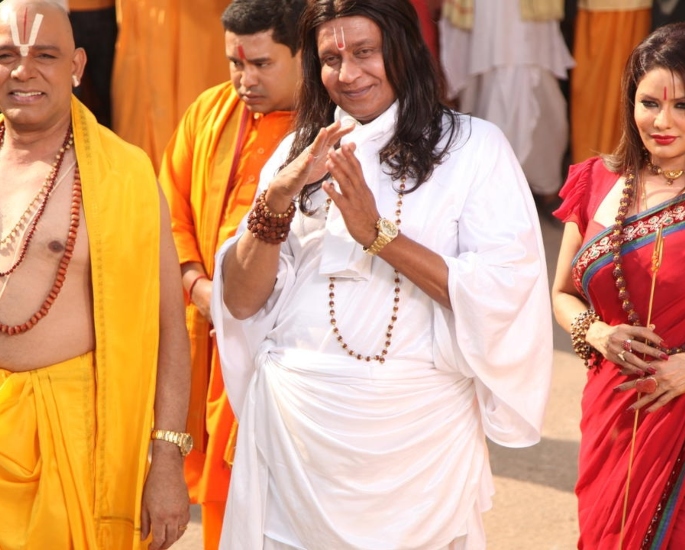
Oh My God featuring Akshay Kumar (Krishna Vasudev Yadav) and Paresh Rawal (Kanji Lalji Mehta) was a big hit but didn’t come without its share of protests and disapproval.
The movie gives a unique take on the system of devotion and worship in India. Owing to this, dissenters called it derogatory and disrespectful towards Hindu deities and beliefs.
It wasn’t well-received by priests and saints in the country either. They took offence to many anti-ritualistic and anti-guru references in the film.
In the major cities of Punjab, spiritual devotees and faith leaders also caused a huge furore.
They demanded a complete ban on the screening of the film.
These protests were led by several pro-religion organisations that forced the theatres and local authorities to stop the screenings.
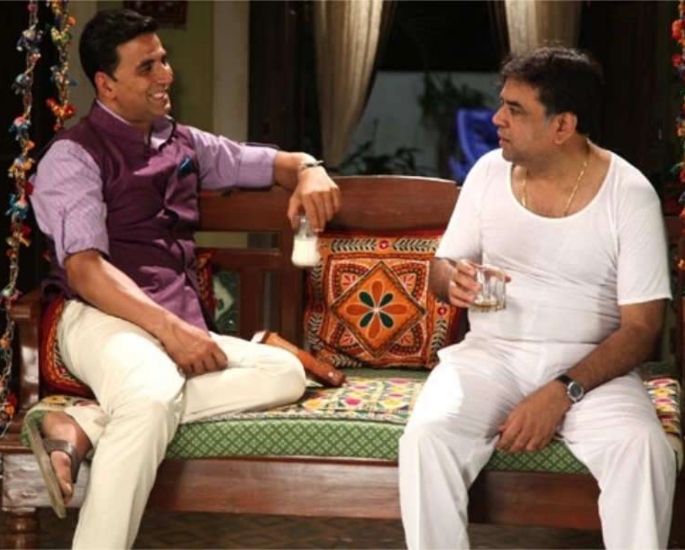
In Jalandhar, the police tried to call representatives of the protesting organisations for a preview but it was later cancelled.
A vice-president of one such organisation, Nimisha Mehta, told Hindustan Times:
“The police have assured us that no screening would be done in the city before satisfying the agitating organisations and removing controversial scenes.
“If the police get the film released, people will not tolerate it and the cops will be responsible for the consequences of people’s ire.”
At that time, the movie could not be played in several cities like Jalandhar, Ludhiana, Amritsar, Nawanshahr and Hoshiarpur.
My Name is Khan (2010)
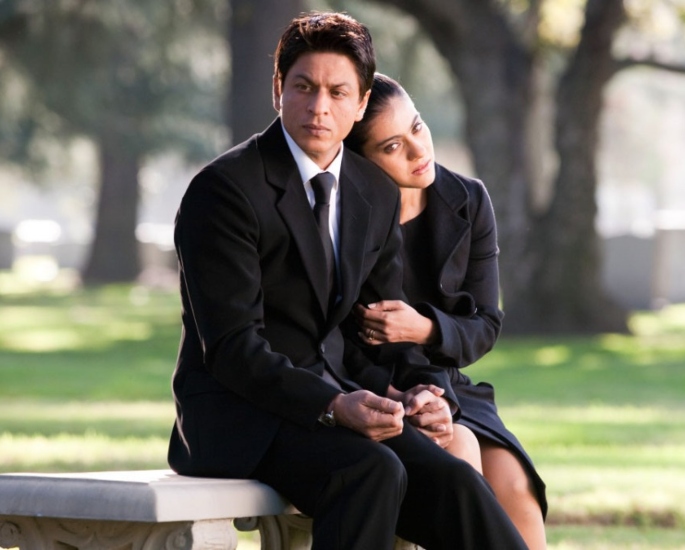
My Name is Khan starring Shah Rukh Khan led to a lot of upheaval at the time of its release. The controversy arose when Shah Rukh made a comment on Pakistani cricketers.
He publicly advocated the inclusion of Pakistani cricketers in that year’s Indian Premier League (IPL).
Shah Rukh also owns a team in the IPL, Kolkata Knight Riders (KKR), that have had Pakistani players in the past.
One of India’s conservative political parties called the actor’s remarks anti-national.
The leaders of the extremist religious outfit demanded an apology and threatened to cause disruption and stop the film’s release.

When Shah Rukh did not apologise, the members of the group took to the streets. They tore down posters and threatened to cause damage to theatres.
The Mumbai police arrested more than 2,000 protesters ahead of the film’s release for rioting and disruption.
However, the film was well-received in other parts of India and the world.
The movie centres on a Muslim guy, Rizwan Khan, played by Shah Rukh. Suffering from Asperger’s Syndrome and living in America, Rizwan has a tough time after 9/11.
Nishabd (2007)

Indian films seldom leave a chance to get into trouble if they tackle a taboo issue.
Ram Gopal Verma’s Nishabd is one of them. It was at the centre of negative attention because it dealt with the issue of an extra-marital affair.
In the film, Amitabh Bachchan (Vijay Anand) plays the role of a man in his 60s. He is shown to be attracted to an 18-year-old girl, played by Jiah Khan (Jia).
The film is allegedly based on the famous book Lolita (1955) by Russian novelist Vladimir Nabokov, which revolves around a similar theme.
Many people in the country were enraged at Amitabh’s choice of character who romances a girl of his granddaughters’ age.
The film has some heated and sensual scenes that did not go down well with Indian audiences.
People from Jalandhar, Varanasi and Ahmedabad (Amitabh’s hometown) turned up in huge numbers to protest against the film.

A local political group in Jalandhar claimed that the movie violated Indian sensibilities and values. The general secretary of the group said:
”The character played by Amitabh is against the traditions of our society.
“It will adversely affect the psychology of the children.”
“Hence, we are protesting against the screening of the film and we’ll continue our protest till the film is banned.”
The protestors shouted slogans against Amitabh, defaced and tore the film’s posters and demanded a nation-wide ban.
However, Nishabd was released eventually but received mixed reviews from the audiences.
Water (2005)
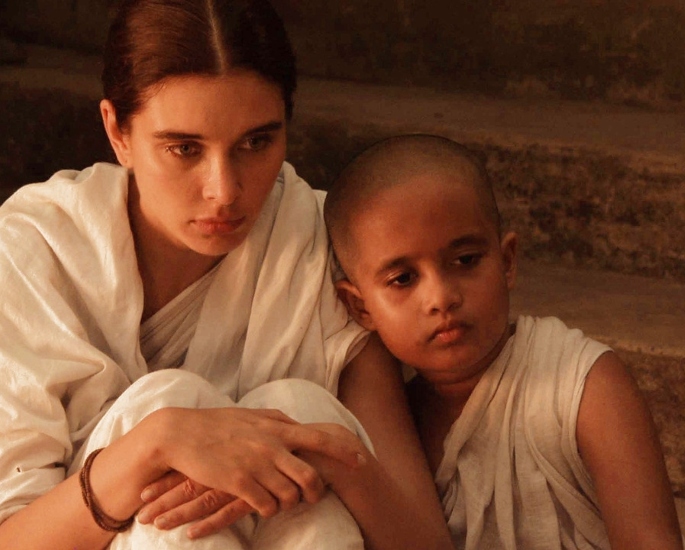
Water has its name firmly registered among the most controversial Indian films of all time. Indo-Canadian director Deepa Mehta is almost always in trouble when it comes to her films.
Water garnered all sorts of criticism and public outrage during its making as well as release.
Deepa’s film tackles a taboo subject, particularly the position of widows in Indian society. This film had pro-nationalists and religious people fuming.
Water is about widows living in inhumane conditions in Varanasi’s ashrams (sanctuary) in the first half of the 20th century.
The movie shows widows living in misery and scarcity. Some of these women are compelled into prostitution by priests who run these places.
Many right-wing groups got upset by such a demeaning depiction of the holy city of Varanasi. They rose up in protest against the film, while it was being made.

Angry mobs barged inside and vandalised the sets and equipment during the shoot. Some even threatened to commit suicide if the filming was not stopped.
Another group tried to burn any available DVD’s of the movie and warned people against their sale. A member of an extremist group stated:
“We will not allow the film to be shown here. It insults Hindu sentiments and depicts Hindu culture in a poor light.”
He also said that if any cinema hall screened Water, they will have to “face the consequences.”
Due to mounting tension and pressure, Deepa moved the shooting of the film to Sri Lanka.
Fire (1998)

Fire is also directed by the ever so brave Deepa Mehta. It is way ahead of its time. It is also one of the first Indian films to show a lesbian relationship.
Shabana Azmi (Radha) and Nandita Das (Sita) play sisters-in-law who are unhappy in their marriage. Due to their loneliness, they develop a homosexual relationship with each other.
After its release, pro-culture activists and one of Maharashtra’s political parties led several protests to get the film banned.
Women from the party’s women’s wing barged into theatres and forced the cinema halls to be shut down.
Protests continued to happen in many places across India with mobs breaking glass panes, burning posters and shouting slogans.
Deepa also received death threats and had to eventually take police safety.

When Maharashtra’s then Chief Minister Manohar Joshi was asked to comment on the protests, he said to a news agency:
“I congratulate them for what they have done. The film’s theme is alien to our culture.”
The film was cleared by the Censor Board and did quite well at the box office. However, the protesters continued to rally for a ban.
They claimed that the film’s homosexuality theme went against the values of their tradition, culture and the sacred institution of marriage.
The Censor Board did a second review and the film was approved without any changes.
Even though these Indian films suffered huge setbacks during and after production, this only added to their overall popularity and appeal.
They became cult films because of their controversial and eye-opening content but also due to the immense fame (or notoriety) they got from these disputes.
After all, bad publicity is also good publicity.




















































